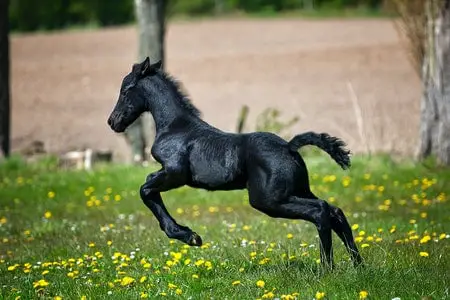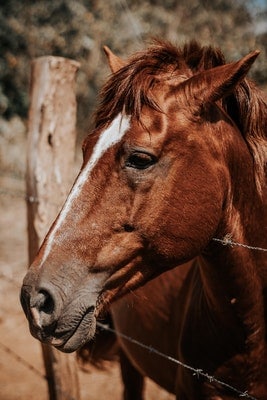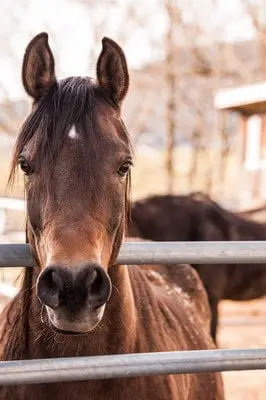In an age where obesity is at epidemic levels in humans, it may seem strange to ask how we can fatten up a horse. After all, horses are already big animals! But there are times when the weight of a horse becomes depleted due to illness or injury.
And just like with humans, putting on some extra pounds can be good for your animal friend’s health and well-being.
It is important for horse owners to know how to fatten up their horses. Horses that are too thin can have a difficult time supporting themselves and may be at risk of developing health problems. Owners should consult with a veterinarian before deciding on any course of action, but there are some things they can do in the meantime.
Horses need about 100 pounds of hay per day, as well as an appropriate amount of grain and vegetables. Increasing these portions will help them gain weight more quickly but it also increases the cost significantly, so owners may want to instead focus on getting better quality hay or finding cheaper sources for other food items such as grains and vegetables.
Horses need to have a healthy body condition, weight, and muscle development. If you notice your horse is starting to show his ribs or has less than desirable muscles in the spine, neck or hindquarters then he might not be eating enough calories. The good news is that there are easy dietary changes which can help him bulk up such as adding fats like corn oil into their diet.
Below is a list of quick tips you can adopt to help fatten up your horse.
- The first step is to feed them a good diet
- They need plenty of hay and grain, as well as fresh water
- Horses should be given at least one ounce of salt per day
- Give the horse a treat now and then to keep it happy and healthy
- Grain can be fed in one large meal or split into two smaller meals throughout the day
Assessing your Horse
When you are first examining your horse, it is important to take a look at the Henneke body condition score (BCS) chart.
The best scores that you want your horses to have is 4 – 6, meaning you can feel but not see their ribs. The withers should be round and have a layer of fat over them, the horse’s neck is rounded with some thick layers on it too. There will also be an indentation in the back called a crease; this shouldn’t look pronounced or deep when examined closely though. Other good traits include well developed backbone as well as strong tail head and hip bones which all contain plenty of meat around these areas for food intake during cold seasons if need arises.

The animal needs to show between four and six rib spaces at once from underneath so they don’t appear thin spread out across its body just enough spots for breathing room.
Diet is the key to a healthy horse, and ribby horses need more than just calories. If your veterinarian has ruled out any underlying health issues causing weight loss. You should be adding extra protein into their diet in order for them to build muscle mass.
Angularity over the withers can also contribute as well.
If you notice that there is sunkenness around neck area then your horse is probably lacking energy stores which may lead to injury.
How to Make Horse Gain Weight Quickly
Horses need a healthy diet of forage and an appropriate amount of feed to maintain good health. Feed should be based off the horse’s body weight, with 2 – 3% being consumed each day while at least 1.5% – 2% comes from some form of forage (20 pounds or so).
To sustain this rate, gradually increase their current intake before shopping around new products.
Before you go out on your next horse feed shopping trip looking for something new to try in place of old favourites like oats, grain mixers and more. There are several key factors that every equine rider needs to consider if they want their favourite four legged friend living long enough without any major issues.
If your horse had a restricted amounts of good-quality hay, then to help your horse gain weight, increasing his current forage ration until his total feed reaches at least 2.5% of his desired bodyweight would help. In other words, if your horse currently weighs 1,000 pounds and you’d like him to be 1125 then the target would be 27.5 lbs from a high quality hay source such as an Alfalfa hay or fresh pasture (depending on what is available).

For most horses that will require more calories than they are able to get through their diet alone so adding some grain may also provide additional energy in order reach this goal safely while considering all aspects including nutrient needs and individual tolerances.
You want to find the highest quality hay for your thin horse. One way is by squeezing a handful of it; stiff stalks that hurt are not good when you need high calorie feed! Another way, which may also tell how fresh the hay is, would be sending off a sample to have its nutritional value assessed in an agricultural laboratory.
Splitting up grass hay with alfalfa can help to provide a more nutritious diet for your horses. Alfalfa is higher in protein and calories than most other fodder, so it’s an excellent choice if you want to put some weight on the horse that needs filling out. If they’re not too good about eating their whole ration of hay at once, then these cubes or pellets may just be what they need.
Beet pulp is an excellent source of energy for horses and has been shown to help improve your horse’s digestive health.
Beet pulp contains about the same digestible energy as hay, and most horses seem to like it. It’s also a great medium in which you can blend other supplements or additives such as oils or rice bran into your horse’s diet because beet pulp by itself does not contain complete nutrients that are necessary for an equine to maintain their health and vitality. To introduce this new foodstuff gradually mix one pound of dry beets per feeding up to 0 1/2% of your horse’s weight
Reasons why a Horse Would Lose Weight
Horses are grazing animals, which means they require a lot of food to maintain their weight. When horses lose too much weight, it can be due to a number of different factors including poor nutrition and disease.

Losing weight is a common problem for many horse owners. Many people believe that this type of issue is strictly an owner’s fault, but there are several other reasons why your horse may be losing weight.
Below are some reasons on why your horse might be losing weight.
- A horse may be losing weight because it is not getting enough feed
- A horse might be losing weight if it has a medical condition such as colic or laminitis
- Horses often lose weight when they are pregnant
- The horse could also be hypothyroid, which means that the thyroid gland doesn’t produce enough hormones to regulate metabolism and growth in the body
- Sometimes horses lose weight because of an injury or illness that requires them to rest for a long time
- Stress can cause horses to lose weight too, so make sure your horse is comfortable and happy at all times!
Final Thoughts
The reasons why a horse would lose weight can vary but most often it is due to an underlying medical condition.
One reason a horse would lose weight is if they are not getting enough food. Lack of nutrients will cause them to be malnourished and not grow well, resulting in starvation. Another reason could be that their digestive system has been irritated by something like parasites or an ulcerated stomach lining.
This can make it hard for the animal to absorb all the nutrients from its food which results in malnutrition. If you notice your horse losing weight very quickly or have noticed other symptoms as mentioned above, please contact your vet! They may require medication or surgery depending on what’s causing the issue.

